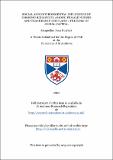Files in this item
Social and environmental influences of smoking behaviour among female nurses and teachers in Scotland : the role of social capital
Item metadata
| dc.contributor.advisor | Boyle, Paul | |
| dc.contributor.author | Dutchak, Jacqueline J. | |
| dc.coverage.spatial | 362 p. | en_US |
| dc.date.accessioned | 2018-06-20T12:32:47Z | |
| dc.date.available | 2018-06-20T12:32:47Z | |
| dc.date.issued | 2002 | |
| dc.identifier.uri | https://hdl.handle.net/10023/14335 | |
| dc.description.abstract | Cigarette smoking is one of the most important causes of morbidity and premature mortality in developed countries. Since almost one-third of women in Scotland smoke, the health implications are paramount. Smoking rates among female professionals have decreased in recent years in the UK but they have not fallen equally for all occupations within this group. Historically, female nurses have had higher rates of smoking than other women in the general population while female teachers have had much lower rates. Recent work has revealed that smoking prevalence among nurses has declined in the UK and has reached levels similar to or lower than that of other women. The aims of this thesis are to gain a recent estimate of smoking prevalence among female nurses and teachers in Scotland, to find out why some of these women smoke, why others never started, and why others stopped. This endeavour considers their work and home environments, their interactions with colleagues within and outside the workplace, and their levels of trust, networks, and co-operation in the workplace and neighbourhood. In addition to their current circumstances, this thesis also examines retrospective social capital and deprivation. This study revealed that 31% of nurses and 7% of teachers were smokers, with prevalence of the former much higher than that of other women in the same social class and the latter prevalence much lower. The significant predictors, following multivariate analysis, of smoking and its cessation are varied and include individual, social, economic, and environmental factors. Of particular interest to this study is iv that each of the constructs of social capital have significant and independent effects on smoking and its cessation but that the relationship is neither entirely positive nor completely linear. Furthermore, smoking is often used by women in order to create space and time for oneself in order to break from reality. It is also used to by many women as a means of exerting control over their life. Policies to prevent smoking or aid in its cessation must therefore recognise the important roles of social, economic, environmental and biological influences and how these vary during the lifecourse. | en_US |
| dc.language.iso | en | en_US |
| dc.publisher | University of St Andrews | |
| dc.subject.lcc | HV5748.D8 | |
| dc.title | Social and environmental influences of smoking behaviour among female nurses and teachers in Scotland : the role of social capital | en_US |
| dc.type | Thesis | en_US |
| dc.contributor.sponsor | Committee of Vice-Chancellors and Principals of the Universities of the United Kingdom | en_US |
| dc.contributor.sponsor | University of Leeds. School of Geography | en_US |
| dc.contributor.sponsor | University of St. Andrews. School of Geography and Geosciences | en_US |
| dc.type.qualificationlevel | Doctoral | en_US |
| dc.type.qualificationname | PhD Doctor of Philosophy | en_US |
| dc.publisher.institution | The University of St Andrews | en_US |
This item appears in the following Collection(s)
Items in the St Andrews Research Repository are protected by copyright, with all rights reserved, unless otherwise indicated.

